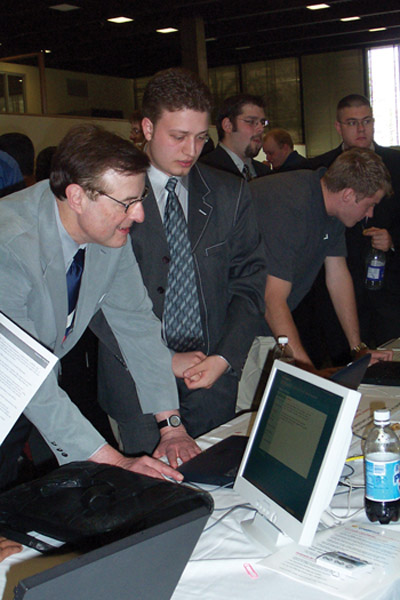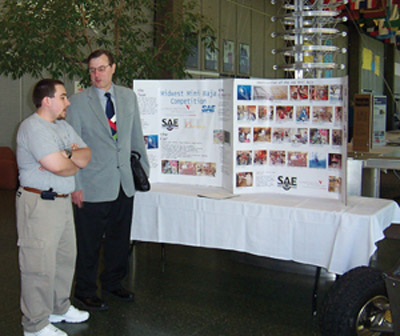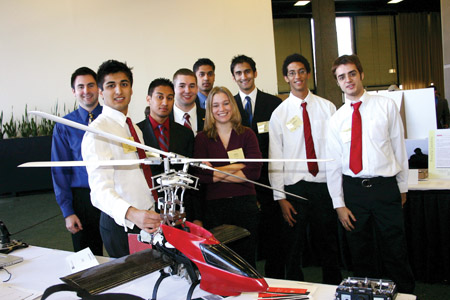It was an idea that was ahead of its time.

In the mid-’90s, many universities began to respond to what industry leaders were telling them about college graduates: that they needed a more holistic education and the ability to communicate and be broad thinkers.
President Lew Collens was listening.
Then Vice President and Provost Hassan Nagib proposed to Lew an idea for a program that would elevate the traditional capstone course. This new program would assemble larger teams of 5–20 students who would address bigger, more complex problems while learning valuable workplace skills. Projects would team faculty from across the university, and a champion from a single department would drive each project. This idea echoed the recommendations of the National Commission for IIT, which stressed the importance of distinguishing IIT’s academic program.
The Interprofessional Projects (IPRO) program launched in spring 1995. Nagib was the lead faculty member of the initial project, which dealt with the range of technical, economic, political, and social issues associated with the future of high-speed rail in the United States.
In the early days of IPRO, few of us faculty members had experience with interdisciplinary work. In time I have come to appreciate the efforts of the IPRO office to inspire new thinking, as well as the responsiveness of the faculty. The faculty have grown professionally by incorporating others’ perspectives and work with their own, and by increasingly exploring collaborative research opportunities at the boundaries of the professions where it is recognized that significant innovation occurs.
Today, IPRO is a truly unique program, in large part due to the many innovative ways that the courses are delivered. It also is distinct because IIT requires all undergraduates to take IPRO, whereas most other universities make similar programs available only through particular majors or on a voluntary basis.
Faculty from throughout the university are invited to propose topics. We also make sure that a diverse group of students participate in each course. Sponsorship also plays an important role, with 25–30 percent of the teams receiving sponsorship from companies such as Motorola or the Chicago White Sox. These sponsoring organizations, including industry leaders and alumni, call on students to research a complex and multifaceted topic, oftentimes on behalf of their companies or to augment their own research endeavors.
In offering IPRO, IIT was on the cutting edge. Now IIT is, to some extent, a leader in the field of interdisciplinary education.

The topics covered range from “edutainment,” applying electronic game methods to improving learning effectiveness, to accurately monitoring the respiration rate for those afflicted with asthma. Twice per year the university holds IPRO Day events, where teams present their work and are evaluated by faculty, professionals, and other students. IPRO topics usually carry over from semester to semester and year to year, allowing a new crop of students to build upon and advance an idea generated by an earlier group, with projects often taking social, political, or economic dimensions.
With its interdisciplinary and practical emphasis, IPRO was—and still is—a progressive approach to education. For example, the sole accrediting body for engineering and technology programs in the United States is the Accrediting Board for Engineering and Technology (ABET). In 2000, ABET transitioned from its old criteria to what it called ABET 2000. One of the fundamental distinctions of the new ABET 2000 was an explicit requirement for multidisciplinary teamwork. In offering IPRO, IIT was on the cutting edge. Now IIT is, to some extent, a leader in the field of interdisciplinary education.
While Lew’s intent with IPRO was to improve the academic experience for students, both IPRO and EnPRO have given back much to the university. Today, the disciplines join much more organically, and faculty and students learn from each other.
The projects have been extremely impressive. KlarAqua, a sustainable, low-cost water purification system, is just one such example. In the project, students drew upon the work of Nasrin Khalili, an Environmental Management faculty member, who had developed a concept for improving clay filters used to purify water in remote villages. Students integrated readily available buckets, locally made clay pots, and other available materials into an economical system that improves the efficiency and quality of water filtration at the local family level in such areas as rural Mexico.
In 2006, KlarAqua won first place and a prize of $15,000 for being the most innovative and socially responsible design at the Social Entrepreneurship Idea to Product competition.
IPRO has benefited the university on multiple levels. It has enabled us to surpass accrediting requirements; during our last ABET visit, the board identified IPRO as one of the strongest features of the IIT curriculum. The North Central Association echoed this in its more recent university-wide accreditation of IIT. And because students mention their IPRO experience when they interview for jobs, professionals who recruit and work with our graduates are increasingly aware of IIT’s academic programs and special approach in preparing students to make substantive contributions in cross-functional team organization environments.
In 2001, Lew approached Board of Trustees member Ed Kaplan (ME ’65) about helping to expand IPRO to create the concept of Entrepreneurial Projects (EnPRO) as a special component of the IPRO program.
An EnPRO tweaks the IPRO project focus, stimulating students to learn business skills by developing an idea for market. In an EnPRO, students evaluate the technical and business feasibility of a new venture idea, build prototypes, gain user feedback, and eventually formulate a business plan to explore the financial opportunity for starting a business.

The students have shown real enthusiasm for EnPRO. One creative project developed a system whereby capable tailors in places such as India, where individual craftsmen are being displaced by larger operations, are provided jobs making clothes for customers who place orders online.
Every year the IPRO program continues to improve. We are developing a new course sequence in team leadership and project management, with an initial focus on service learning team leadership. Supported by a grant from the National Science Foundation, this project will work to create a formal service-learning experience within the IPRO program that incorporates best practices, in association with Purdue University’s Engineering Projects in Community Service Program.
Recently, IIT held a national conference about best practices in interdisciplinary team project programs, presenting IPRO as a model approach that is distinctive. Dozens of universities participated. The conference demonstrated how far the program has come, and how it has achieved national prominence.
On a personal level, I have especially enjoyed the international service learning aspect of IPRO, which has afforded me wonderful new teaching experiences.
A few years ago one of my IPRO teams went to El Salvador for a week. It was a very diverse group, with students representing a number of different majors and backgrounds, including an architecture student of Asian-American descent who had grown up in a small town in Africa where her father was a practicing physician.
We spent five days teaching a course on treating spinal deformities such as scoliosis with orthoses in El Salvador at Don Bosco University, the only internationally accredited orthotic and prosthetic education program in Latin America. About a dozen of our students teamed up with students from Don Bosco University to provide treatment for patients who participated in the course.
One of our students, Elizabeth, had ambitions to become a doctor. As I divided the students into groups with their patients, I handed her some X-rays and said, “This is your patient.”
Her eyes bugging out, she said, “Professor Meade, I’m so scared.”
“Why?” I asked.
“I don’t want to screw it up.”
Now, Elizabeth is finishing medical school.
I went there to teach biomechanics and left very humbled. It’s a very powerful experience. I’m grateful that we can offer such opportunities to our students.
While Lew’s intent with IPRO was to improve the academic experience for students, both IPRO and EnPRO have given back much to the university. It has made our students more attractive to employers while exposing us to organizations that might otherwise not have heard of IIT. And, for some of us, it’s pushed us to teach and learn in a more flexible and fluid manner than we had previously. Today, the disciplines join much more organically, and faculty and students learn from each other.